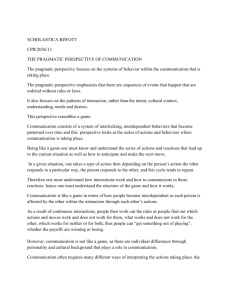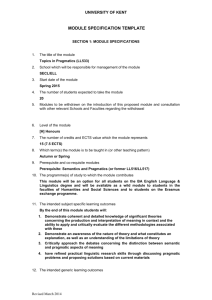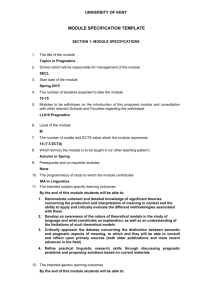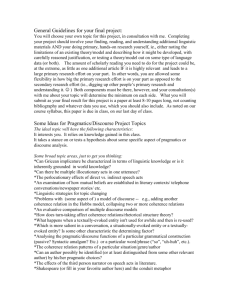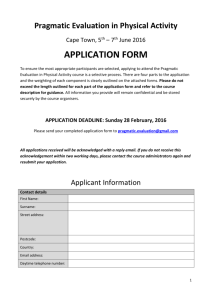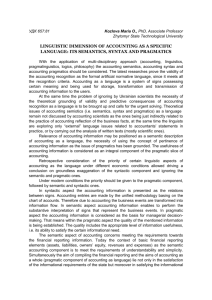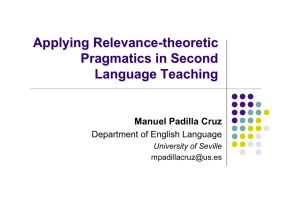Pragmatic Attending Skills Training for Oral Skills Classes
advertisement
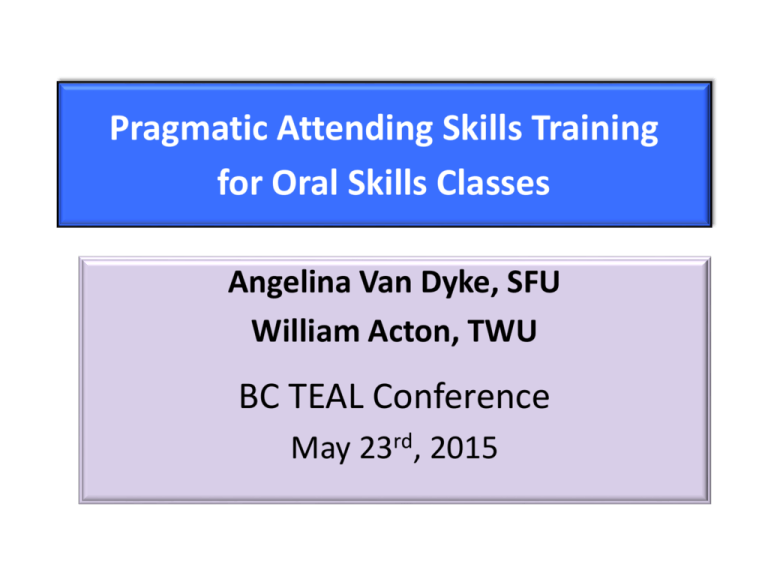
Pragmatic Attending Skills Training for Oral Skills Classes Angelina Van Dyke, SFU William Acton, TWU BC TEAL Conference May 23rd, 2015 Pragmatics The study of communicative action in its sociocultural context. Pragmalinguistics: linguistic resources for conveying communicative acts and relational or interpersonal meanings. Socio-pragmatics: social perceptions underlying interpretation and performance of communicative action. Importance in SLA: (Kasper and Rose, 1999) Constrains linguistic forms and their acquisition Is a type of communicative knowledge and object of L2 learning itself Pragmatic Competence Pragmatic Competence The ability to communicate your intended message with all its nuances in any socio-cultural context, and to interpret the message of your interlocutor as it was intended (Fraser 2010) o o Context is both external (sociocultural) and internal (cognitive inferential skills) PC is the ability to trigger the appropriate mental networks at the right time in each situation. Teaching Pragmatics Can pragmatic competence be taught? (Kasper, 1997) Is pedagogic intervention needed? o Assisted performance may build pragmatic competence (Alcón Soler, 2002). o The way learning is organized impacts pragmatic development (Ohta, 2001 in Taguchi, 2007 p. 328) Teaching Pragmatics Without intervention: lack of metapragmatic consciousness in L2 pragmalinguistic knowledge L1 / L2 corresponding form-function mapping (Kasper, 1997) grammatically incorrect but pragmatically appropriate utterances vs. pragmatically inappropriate and grammatically correct utterances (Bardovi-Harlig and Dörnyei, 1998) fluency and accuracy don’t develop concurrently (Taguchi, 2005) Teaching Pragmatics Pedagogic intervention involves: ochoice of communicative acts ostrategies realizing these acts scripted expressions level of politeness level of directness (implicature) level of formality olinguistic form ocontent and semantics MAKING AND RESPONDING TO POLITE REQUESTS Linguistic Forms Meaning/Function Situation/Manner Could I please have some milk? A polite request using past tense of “can” in a home – formally asking the host or hostess for something Could you please close the door? Asking someone to do something for you in an office, home or car formal and polite Would you mind repeating that, please? Polite request using past tense of “will” student to a teacher or two people on the phone Would you mind if I opened the window? Polite request using conditional distance Positive response with intoned appreciation Negative response showing pragmatic deference in a car or on a public bus, train or boat informal and polite Not at all! If you don’t mind, I’d rather keep it closed. formal, using negative politeness Teaching Pragmatics Sample Discourse Completion Task: You are a member of a student organization. You are in a meeting now. You would like to take some notes, but you do not have a pen. The president of the organization is sitting next to you and might have an extra pen. – You: ___________________________________________ – President: Sure. Here you go. Keep it, I have another one. Pragmatic Intervention for ELLs Culturally situated too difficult for beginning ELLs? Accuracy and Fluency concurrence? Resources: oPragmatic Universals L1 transfer oSmall Talk (Hunter, 2011) oGood Psychology Co-operative Attending Skills Training (CAST) oProsodic Pronunciation Practice Acton Haptic English Pronunciation System © 2014 (AH-EPS) Some Pragmatic Universals (Kasper, 1997) All language learners know something about: Principles of conversational organization Conversational routines Implied meaning Principles of Politeness Meta-pragmatic awareness Levels of directness Small Talk (Hunter, 2011) Student-Led (adult intermediate) o Choose topics and discussion questions o Group discussion Teachers Focus on Accuracy and CF o Listen and record student errors o Fluency is uninterrupted o Repair and uptake list of errors o Students fluently produce correct forms o Promotes self-correction Small Talk Worksheet Treatment options for error transcriptions: o Give written metalinguistic feedback o Give error list and correct version in form of audio recording or dictation Sentence / Expression Speaker Pronunciation Context / Vocabulary This is the natural park which called Kandling. Speaker A National /natural? Kandling is place name? Speaker B Metalinguistic Feedback My favourite article use, place verb “to be” missing article Co-operative Attending Skills Training (CAST) First Application - training psychologists Applied to ELT - Acton and Cope (1999) Mid/high beginner + o lowers affective filters o raises participation o instills genuine listening skills Teach students to listen - will develop a winning disposition in any conversation. Prosodic Pronunciation Practice Haptic Techniques o movement + touch o external heuristic that maps sounds on and around the body Prosodic Elements o Rhythm, intonation, expression o Convey pragmatic intent: irony, emotion, implied meaning o Develop fluency, accuracy and “nuance” Systematic Practice o increased retention through homework modules o learned elements retrieved in spontaneous speech Setting up CAST Assign students to bring three stories o Short and Specific (2-3 min.) o Interesting o Personal Following Class - Groups of 3 or 4 in rounds o Story Teller o Attender (Listener) o Observer 1 – observe attender and record what is said on CAST checklist o Observer 2 – observe effect of listener feedback on storyteller Setting up CAST Uptake of Interactions o Observers share observations o Structures and functions are classified with prosodic pronunciation practice Levels and Class Formats Discussion: How might attending skills integrated with haptic techniques be applied to your class format and level? How might small talk be integrated with haptic techniques in repair and uptake of errors? i.e. articles and verb inflections? Research References • • • • • • • • • • • • • • • • Acton, William and Cope, Corinne. (1999). Co-operative Learning. JALT Applied Materials, Eds. David Kluge, Steve McGuire, David Johnson, and Roger Johnson. Acton, W., Baker, A. , Burri, M., Teaman, B. (2013). Preliminaries to haptic-integrated pronunciation instruction. In J. Levis, K. Le Velle (Eds.) Proceedings of the 4th pronunciation in Second Language Learning and teaching Conference, Aug. 2012. (pp. 234-244). Ames, IA: Iowa State University. Alcón Soler, Eva. (2002). Relationship between teacher-led versus learners’ interaction and the development of pragmatics in the EFL classroom. International Journal of Educational Research 37, 359-377. Arundale, Robert B. (1999). An alternative model and ideology of communication for an alternative to politeness theory. Pragmatics, 9(1), 119. Bardovi-Harlig, K. and Dörnyei, Z. (1998). Do Language Learners Recognize Pragmatic Violations? Pragmatic versus Grammatical Awareness in Instructed L2 Learning. TESOL Quarterly, 3(2), 233-262 Brown, Penelope & Levinson, Stephen C. (1987). Politeness: Some Studies in Language Universals. Studies in Interactional Sociolinguistics 4. Cambridge UP. Fraser, B. (2010) Pragmatic Competence: The Case of Hedging. In: G. Kaltenböck, W. Mihatsch and S. Schneider (eds.), New Approaches to Hedging (pp. 15–34). Bingley: Emerald. Hunter, James. ‘Small Talk’: developing fluency, accuracy, and complexity in speaking. ELT Journal. doi: 10.1093/elt/ccq093 Kasper, Gabriele. (1997). Can Pragmatic Competence be Taught? Second Language Teaching & Curriculum Center, University of Hawai’i. Kasper, Gabriele. (2006) Speech Acts in Interaction: Towards Discursive Pragmatics. University of Hawai’i. Kasper, Gabriele and Rose, Kenneth R. (1999). Pragmatics and SLA. Annual Review of Applied Linguistics (19), 81-104. Recanati, Francois. (2006). Semantics and Pragmatics. Chapter 20 in The Handbook of Pragmatics. Ed. Laurence R. Horn and Gregory Ward. DOI: 10.1002/9780470756959.ch20 Schneider, Sickinger, and Hampel. (2013). Pragmatic Competence, Pragmatic Profiling and Cultural Cognition. University of Bonn, English Profile Seminar No. 14. Taguchi, Naoko. (2005). Comprehending Implied Meaning in EFL. The Modern Language Journal, 8(4 ), 43-562. Taguchi, Naoko. (2007). Development of Speed and Accuracy in Pragmatic Comprehension in English as a Foreign Language. TESOL Quarterly, 41(2), 313-338. Takimoto, Masahiro. (2009). The Effects of Input-Based Tasks on the Development of Learners' Pragmatic Proficiency. Applied Linguistics 30 (1), 1-25. doi: 10.1093/applin/amm049
